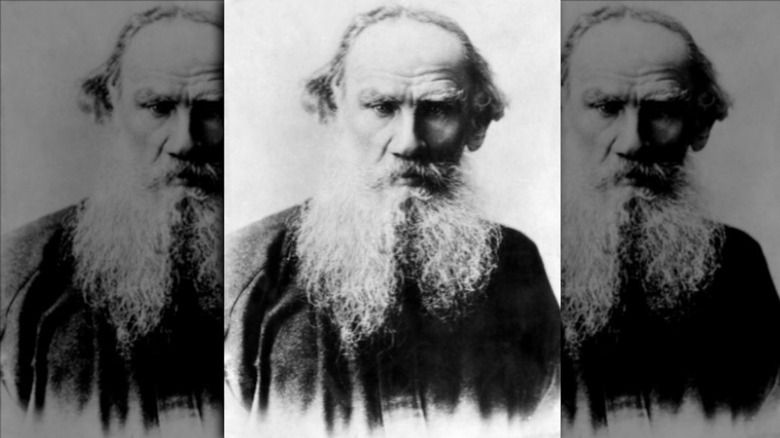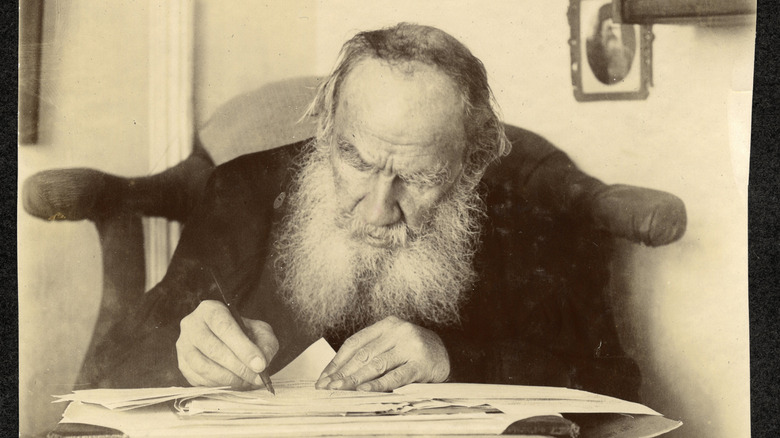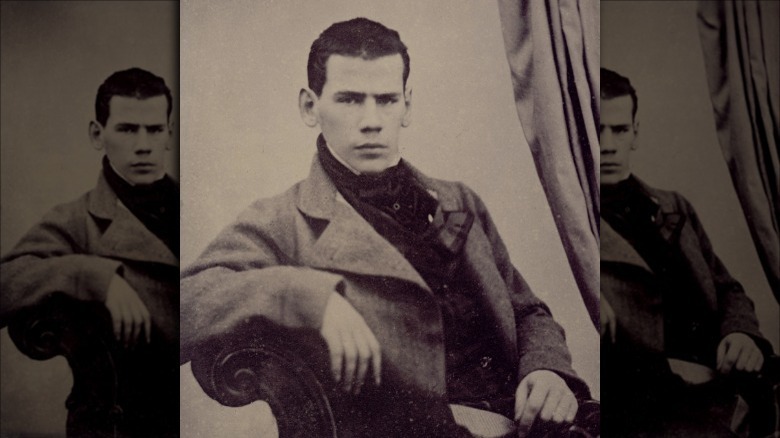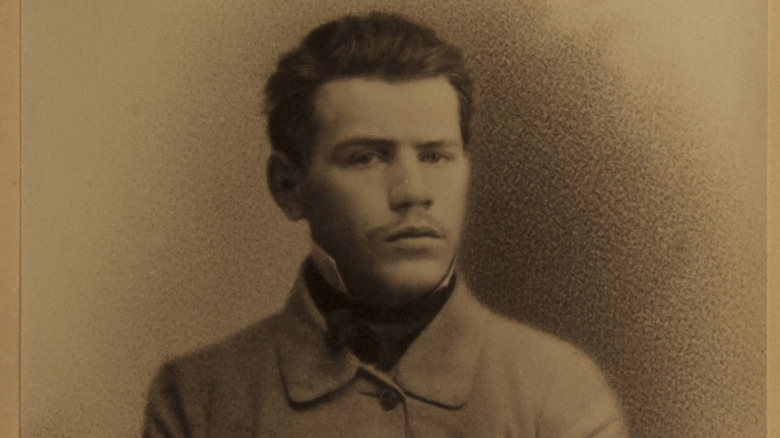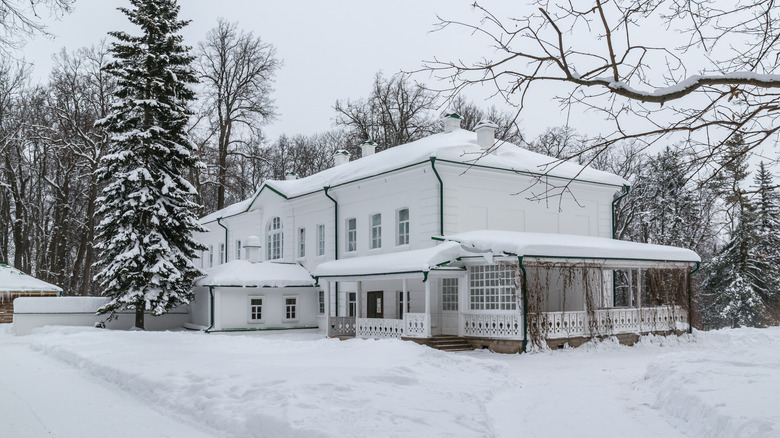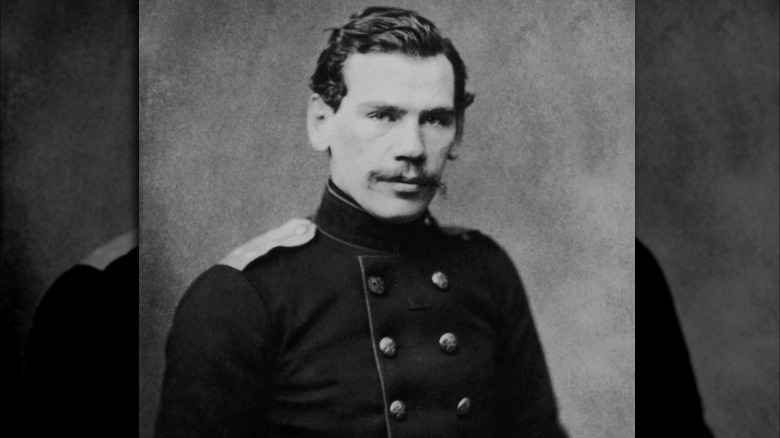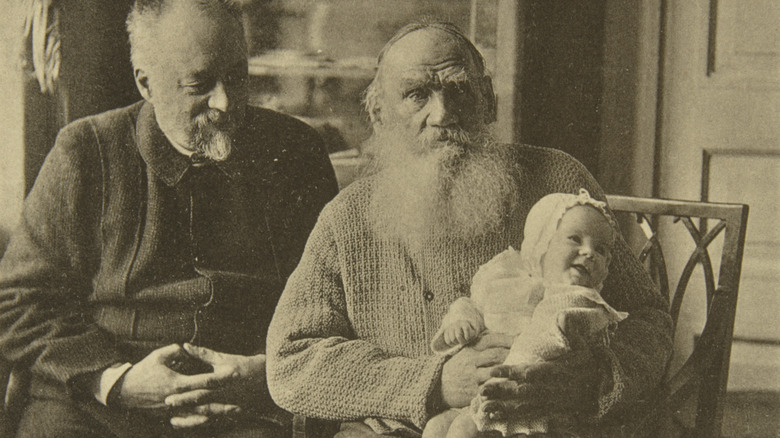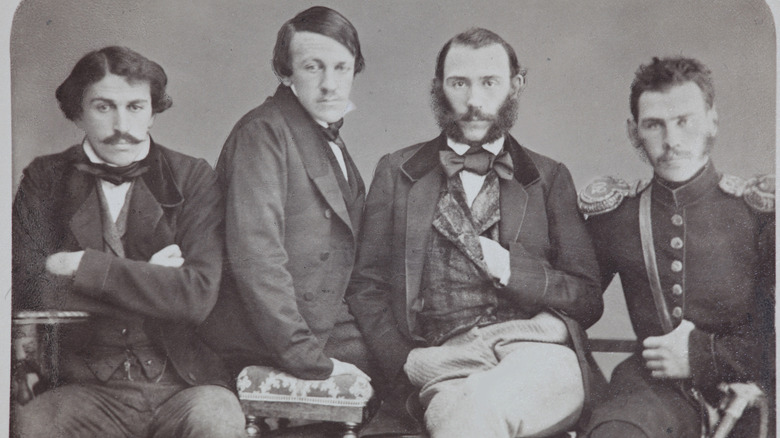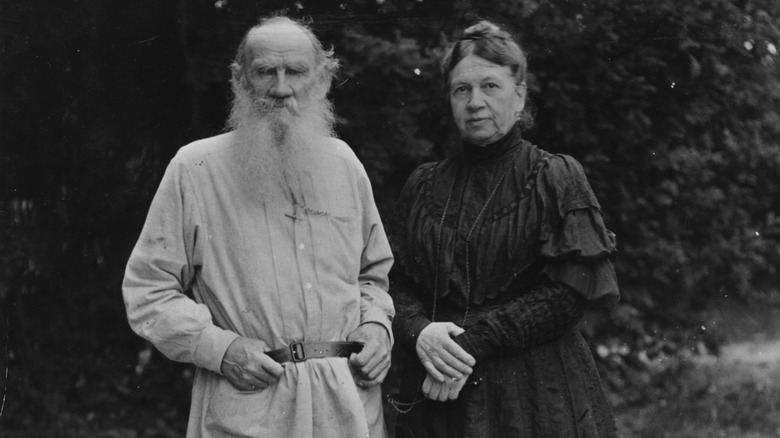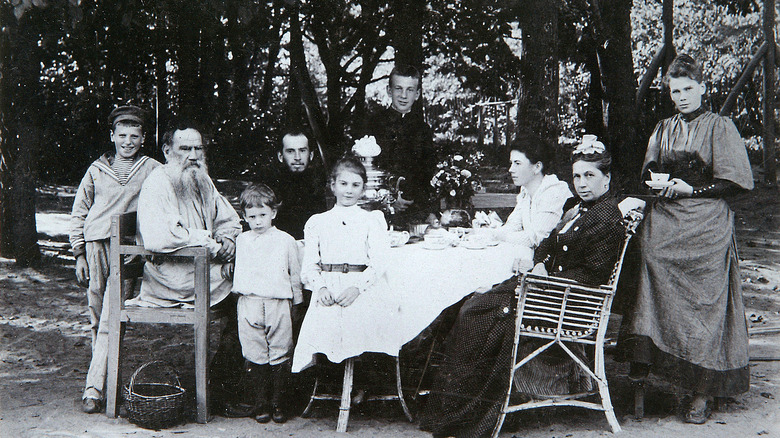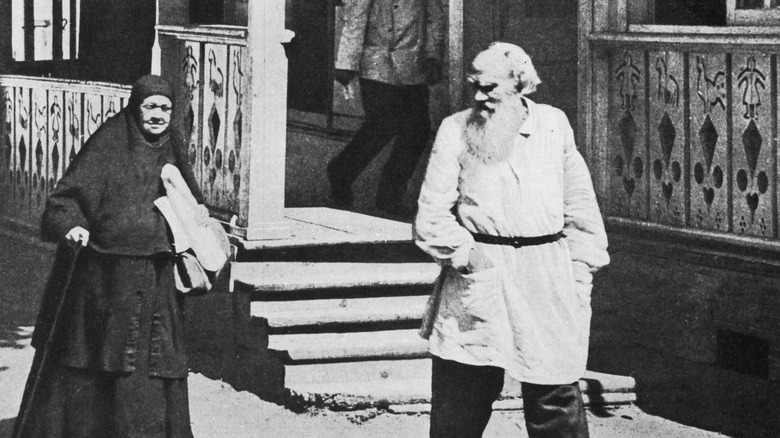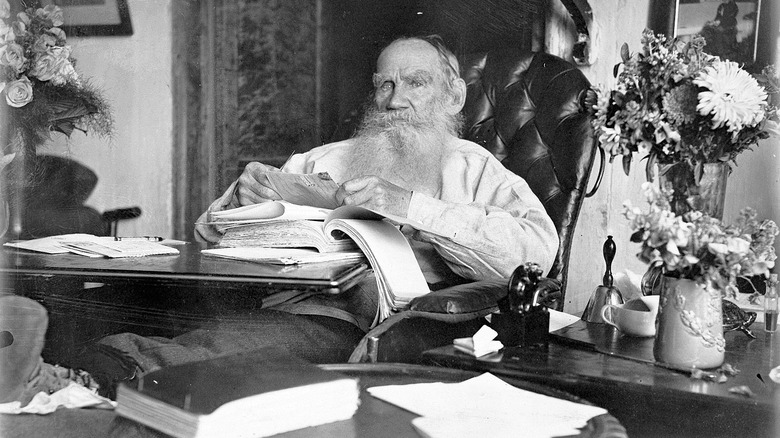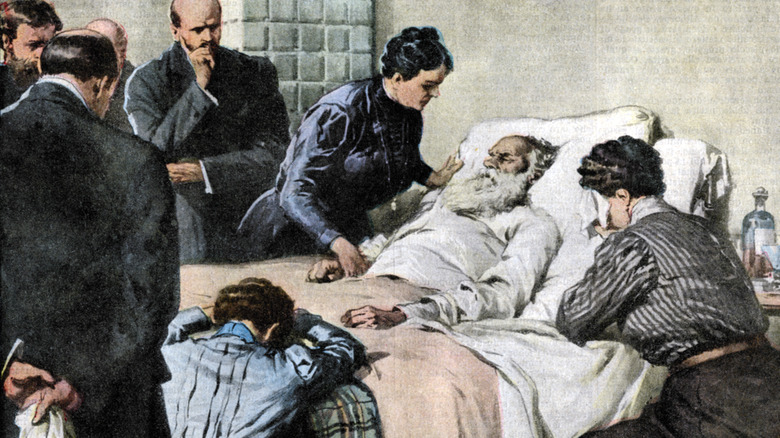Leo Tolstoy's Crazy Real-Life Story
Leo Tolstoy was one of the greatest writers of all time — he's so revered his classic novel, "War and Peace," is used as shorthand for a long, complex novel. That novel, combined with "Anna Karenina" and the novella "The Death of Ivan Ilyich," has cemented Tolstoy's reputation as a literary genius, which has only grown since his death in 1910. As a writer, he's renowned for an almost supernatural ability to replicate real life, to observe his characters and settings so minutely the reader almost comes to regard them as real.
Tolstoy was a complex figure. Born into wealth and aristocratic privilege, he eschewed both in later life and embraced a simple life — but could also be imperious and dictatorial towards others. He preached abstinence — but was tormented by his own lusts and appetites. He regarded himself as a genius and the greatest writer in history — but later in life deprecated writing as a secondary and unimportant activity compared to his spiritual teachings.
Such a complex, arrogant, and mercurial figure was destined to live a life that was anything but boring. If you imagine that novelists are universally sedate intellectuals who never leave the house to go adventuring, you've never met the man who wrote "The Cossacks." Here's Leo Tolstoy's crazy real-life story.
Leo Tolstoy obsessed over lists and rules
Born in 1828, Leo Tolstoy quickly matured into a man who was equal parts supreme arrogance and raging ambition. According to History, when he read about Benjamin Franklin's 13 Virtues, he was inspired to craft a similar list of rules to live by. As Esquire notes, Tolstoy openly referred to himself as an "exceptional human being" when he was just 25 years old, so it shouldn't be a shock that his "Rules of Life" were continuously growing, and came to encompass almost every aspect of his existence.
As Open Culture reports, while many of these rules are pretty sensible (wake up early, go to bed early, get some exercise, watch what you eat), many speak to Tolstoy's endless struggle against what he saw as self-destructive appetites. He had several rules about avoiding women and suppressing lust, for example, and even defined how often he should visit brothels (twice a month was the magic number he settled on).
To supplement these rules, Tolstoy began keeping a "Journal of Daily Activities" when he was just 18. He recorded how much time he spent at different tasks, rated how successful he was at them, and then planned out his next day's activities in excruciating detail. Say what you will about a man who once said with a straight face, "I have not met one man who is morally as good as I am," but he worked hard at perfection.
He dropped out of school
Leo Tolstoy was an exceptionally confident and self-assured young man in many ways. According to the Encyclopedia Britannica, Tolstoy — the son of wealthy aristocrats — was tutored at home until he was 16 years old. At that point, he entered the University of Kazan with a focus on Oriental languages.
According to Biography, the future literary genius didn't exactly excel at his academics. He got low grades and made little progress and quickly transferred into the university's law program, which was surprisingly considered to be a much easier track. A few years later, Tolstoy left school altogether — without ever having earned a degree of any kind. He was basically a college dropout.
The reason for his academic failure isn't a mystery — young Tolstoy enjoyed partying a little too much. In fact, Salon reports that when Tolstoy was about to give up on his educational career, he was lying on a bed in a hospital being treated for a venereal disease. Psychology Today notes that Tolstoy spent most of his time at university "drinking, gambling, and consorting with women."
Of course, Tolstoy was rich, and so he had the option of returning home to his family's estate and educating himself as he pleased — which is exactly what he did.
He spent his youth carousing
The Christian Science Monitor reports that when Leo Tolstoy proposed marriage to Sofya Behrs, he showed her his diaries, which he'd kept since the age of 18. In them, Behrs read about Tolstoy's lengthy history of wild living, including many, many love affairs (and his opinions about his former lovers).
In fact, Russia Beyond speculates that Tolstoy may have suffered from sex addiction. In his diaries, he writes at one point, "I have to sleep with women. Otherwise, lust doesn't give me a single spare minute." And he was treated for venereal diseases at least twice. Although he hated himself for his libidinous ways, he only managed to stop the behavior after marrying Behrs — although he did get her pregnant 13 times, so this was more of a redirection than a true change.
After flunking out of school and serving in the military during the Crimean War, author Henri Troyat notes that Tolstoy went through a period of serious alcohol abuse. His drinking was so bad many of his acquaintances were shocked, and these are Russians, so you know it had to be pretty bad. In his later years, AfterParty Magazine reports that Tolstoy wrote about alcohol's insidious appeal in an essay called "Why Do Men Stupefy Themselves?" in which he concluded, unsurprisingly, that self-loathing is a big reason people abuse substances.
He once lost his house gambling
In his youth, Leo Tolstoy was an inveterate gambler. According to author Andrei Zorin, Tolstoy's gambling — usually on card games — went so poorly he began borrowing money heavily despite having been born into a rich aristocratic family. As noted by historian Amanda Prahl, one reason Tolstoy elected to follow his older brother Nikolai into military service was to try and escape his crippling gambling debts.
Historian Rosamund Barlett believes that Tolstoy suffered from an addiction to gambling, noting that his family had a history of such pursuits. At one point things got so bad Tolstoy was forced to sell the mansion on his family's estate, Yasnaya Polyana — the house he was born in — to a neighbor. In a humiliating moment, the house was dismantled brick by brick and transported at great expense nearly 20 miles away.
Even that didn't stop Tolstoy from placing bad bets. Years later, when he was about to get married, Tolstoy was forced to beg his publisher for an advance of 1,000 rubles in order to pay off some of his old gambling debts. His marriage seemed to sober him up, however — Tolstoy never gambled again for the remainder of his life.
He served in the Russian army and saw combat
According to HistoryNet, at the age of 24 Leo Tolstoy was pretty much a failure in life. He'd spent his college years gambling, drinking, and contracting syphilis. He returned home without any degree to show for his efforts and turned his efforts towards improving the lives of the peasants who lived on and around his family's estate — only to earn their scorn. There really wasn't much else for the young aristocrat to do but join the army, which he did in 1852 along with his brother Nikolai.
The New Republic makes clear that Tolstoy's war experience in the Crimean War was the seed that eventually transformed him into one of the greatest writers in history. Although Tolstoy was regarded as a competent officer, he was an aristocrat, so he had plenty of spare time to write — and his reports, stories, and letters describing the battles and daily lives of the soldiers were remarkable. In that era the idea of embedded journalists was unheard of, and accurate reports of the fighting and conditions were rare, making Tolstoy's reports invaluable.
His experience informed his later work, most obviously his greatest work, "War and Peace." It also gave him his first publishing successes. His first published story, "The Raid: A Volunteer's Story," appeared in censored form in a leading literary journal to great acclaim.
Leo Tolstoy had an illegitimate child
As noted by Russia Beyond, when Leo Tolstoy proposed marriage to Sofya Behrs, he gave her his private diaries to read as a sign of trust and devotion. In them, she was shocked to read about Tolstoy's gambling and drinking — and his womanizing. She was especially horrified to learn that Tolstoy had an extended affair with a peasant woman named Aksinya — and had fathered an illegitimate son with her, a boy named Timofei.
According to author Ivan Bunin, Tolstoy was tormented over his relationship with a woman so far below his aristocratic station — and his continued obsession over Aksinya made up part of his motivation to get married as soon as possible. For her part, Behrs adopted an immediate and lifelong hatred for Aksinya, often speculating about murdering her and endlessly worrying that her husband had returned to the affair.
According to literary critic Pavel Basinsky, the real loser in the arrangement was Timofei. At the time it was literally impossible for Tolstoy to legally recognize him as his son. All he could do was allow him to live on the grounds and ensure his employment when he was grown. Timofei drank himself to an early grave, forever stuck between the world of the peasant and the world of his rich, celebrated father.
His brother was his best friend
If you're thinking a guy who obsessively journaled his shortcomings, wrote endless rules for life, and thought extremely highly of himself might have had a little trouble making friends, you're not wrong. As noted by Macmillan Readers, Leo Tolstoy had few close friends in his life and felt unattractive to women — in fact, most women he met thought he was a little boring.
His closest relationships were with his brothers, especially his older brother Nikolai Tolstoy. According to Biography, when Leo failed out of college and struggled to figure out what to do with his life, Nikolai convinced him that joining the army was his best option, so Leo joined him in the Crimea as a Junker. Historian Ivan Bunin makes it clear that Nikolai was the most important relationship in Leo's life: He wrote, "When we are together, I am completely happy, and without him, I feel dull."
Because of this intense relationship, it's not surprising that Nikolai's untimely death from tuberculosis when Leo was in his early 30s affected him deeply. He wrote, "Why should one worry or strive if nothing remains of what was Nikolai Nikolaevich Tolstoy?" In his grief, he reevaluated his life up to that point and decided that it was time to give up his wild ways, settle down, and get married.
His marriage was a nightmare
From the outside, Leo Tolstoy's marriage to Sofya Behrs (who became Sofya Tolstoya) appeared to be solid. They were married for nearly 50 years, had 13 children, and seemed like the ideal, stable relationship. As noted by History, Sofya was instrumental in Leo's work, transcribing his terrible handwriting and painstakingly revising his work over and over again (she wound up transcribing "War and Peace" an incredible eight times).
But as noted by The Guardian, Sofya's diaries tell a much different story. Even before Leo's spiritual awakening that saw him reject most comforts and seek to live a simple life based on the peasants on his estate, their marriage was difficult. Leo was imperious, judgmental, and frequently cruel.
The Christian Science Monitor notes that Leo's cruelty was evident when he courted his future wife, vacillating about his desire for her and his commitment to their union right up until the date of their wedding. Once married, Leo was constantly critical of Sofya, and on her part she came to regard his religious preaching as hypocritical. After all, the man preached sexual abstinence while keeping his wife almost constantly pregnant. By the end of Leo's life it's clear Sofya was more of a business manager and housekeeper than a spouse.
Five of his children died young
Despite a tumultuous relationship with his wife Sofya and a belief in sexual abstinence, Leo Tolstoy fathered a lot of children. After marrying Sofya Tolstoy in 1862, the couple had 13 kids over the next 25 years. Additionally, Leo at least one illegitimate son, bringing his grand total of progeny up to 14.
Many of Leo's children lived well into the 20th century — and according to the London Review of Books his daughter, Alexandra, lived to the age of 95, passing away in 1979. But Leo also experienced several tragedies. As noted by Russia Beyond, only eight of his children survived into adulthood. Three of his children died in infancy — according to author Ivan Bunin, Varvara Tolstoy died within a year of her birth, while Pyotr and Nikolai Tolstoy both died with a few months. Alexei lived to the age of 5, and the last child born to the Tolstoy's, Ivan (born in 1888 when Tolstoy was 60), lived seven years.
Leo could take comfort in the fact that his surviving children were dedicated to caring for both him and his legacy — his eldest daughter Tatyana became director of his memorial museum after he died, and his daughters Maria and Alexandra worked on his behalf. And Leo's enthusiasm for having kids paid off in a sense —today there are more than 400 descendants of Leo Tolstoy in the world.
Leo Tolstoy tried to live life as a peasant
As Leo Tolstoy grew older, he became increasingly troubled by many aspects of his life. Despite being an aristocrat and having lived his whole life as a wealthy landowner, Atlas Obscura reports that in his 50s Tolstoy began a campaign to escape his own wealth. He moved into a small house on his estate and began wearing clothing similar to those worn by the peasants who lived nearby. He ate simple, vegetarian food, made inquiries about releasing the copyright on his books, and spent his money establishing soup kitchens and free schools for the poor.
As noted by The Daily Telegraph, Tolstoy was inspired by what he saw as the peasants' stoic and serene reaction to their lives and the knowledge of their own deaths. He concluded that their religious faith was key and began studying the Bible while emulating the people who had inspired him.
BBC News notes that this wasn't completely roleplay for Tolstoy — he actually did it. He worked alongside the farmers on his land, ploughing fields and helping with the constant repairs their humble homes required. At the same time, he never completely moved out of the large, comfortable home he owned, and still often behaved like an aristocrat despite his appearance.
He founded his own religion
Leo Tolstoy was a complex man with a healthy ego. As noted by Atlas Obscura, he experienced a "mid-life crisis" after publishing his novel "Anna Karenina" in 1877, just before his 50th birthday. He denounced his aristocratic lifestyle and the wealth that supported it and turned his exceptional mind to spiritual matters. In the 1890s, he began a fresh translation of the New Testament, reinterpreting them in a unique way.
As noted by The New York Times, Tolstoy's personal interpretation of God became known as "Tolstovstvo." History Today tells us the movement he inspired could be described as a "Christian anarchist reform movement" that saw Christ as a human being who was a pacifist who supported communal living. Tolstoy also preached sexual abstinence, vegetarianism, and self-reliance combined with distrust of the government or organized religion. As The New Yorker explains, the fact that an organized religion coalesced around his ideas irritated the writer, as it violated his own beliefs about organized religion.
As reported by History, this didn't go down well with the Russian Orthodox Church, which promptly excommunicated Tolstoy (the excommunication is still in effect). People still practice Tolstovstvo to this day.
He ran away from home when he was 82
According to History, as Leo Tolstoy aged his determination to tear down his aristocratic life grew. In the last few decades of his life he lived like a peasant, dressing in rough clothes and eating humble meals, gave away many of his possessions, and even tried to give away the copyright to his work (his wife, worrying over how they would support their large family, put a stop to that).
By 1910, when Tolstoy was 82 years old, he'd grown frustrated with the endless interruptions and responsibilities of being a wealthy landowner, as well as a famous author. Atlas Obscura notes that Tolstoy wrote of "the trouble of life" and complained of the "perpetual guests, perpetual visits and visitors, perpetual cinematograph operators, beset me at Yasnaya Polyana, and poison my life."
On October 28, 1910, Tolstoy put on his peasant clothes and went to the local train station with his personal doctor. He intended to travel quietly to land owned by one of his sisters in order to live in peace. It didn't quite work out — Tolstoy's movements were tracked by newspaper reporters, and his journey grew longer and longer as he sought to elude the press. On November 15, Tolstoy became ill, and he died five days later, surrounded by the people he'd been trying to escape.
